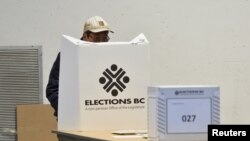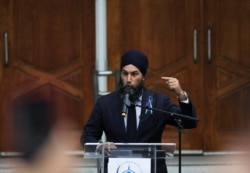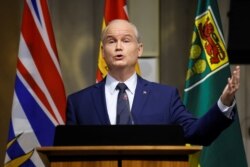Canadian Prime Minister Justin Trudeau will announce on Sunday a September "snap" election midway through his second term, national news media are reporting, citing unnamed sources.
The reports say the election will be held on September 20, allowing only the shortest campaign permitted by law — 36 days.
Canadian law allows a federal administration to serve up to five years, but the sitting government sets the election date and can call for early elections at any time. Trudeau's Liberal Party was reduced to minority status in parliament in the most recent election in 2019.
Canadian leaders usually call early elections when they are ahead in opinion polls and believe they can improve their standing in parliament. The latest polls show Trudeau's Liberals ahead of four other parties with 35.8% support — considered just enough support to secure a majority government, according to the Canadian Broadcasting Corp.
"It's highly unlikely that the election will conclude with a change of government," said Marcus Kolga, a senior fellow with the MacDonald-Laurier Institute. "The Liberals have a seven-point lead ahead of the Conservatives going into the election and current seat projections have them in majority territory."
That is a marked improvement from its standing earlier in the year, when Canada lagged far behind the United States in rolling out coronavirus vaccines. Since then, the country has surged ahead of its southern neighbor and has fully vaccinated more than 63 percent of its population.
Trudeau, the son of the country's most acclaimed modern prime minister — Pierre Trudeau — also receives high marks from analysts for his handling of Canada-U.S. relations before and during the administration of former U.S. president Donald Trump.
Despite a series of high-profile trade disputes and, at one point, being described by Trump as "very dishonest & weak," Trudeau managed to minimize friction and did not downgrade intelligence cooperation with the U.S. even when other allies did.
"Over the last three American administrations no world leader has navigated the U.S. relationship better than Prime Minister Trudeau," former U.S. ambassador to Canada Bruce Heyman told VOA.
Among other achievements, Heyman lauded Trudeau's role in the re-negotiation of a crucial free trade agreement among Canada, the United States and Mexico.
Kolga cited the government's handling of the pandemic as a factor in the decision to go to the polls so early, but warned of a possible backlash.
"There may have been some doubts about the effectiveness of the government's response to the pandemic late last year before vaccines were administered, but there haven't been any catastrophic failures and overall Canadians approve of the Trudeau government's handling of the crisis," he told VOA.
"However, the timing of the election may be questioned by many Canadians, given the rising fourth wave and the lack of any credible reason to call an election beyond political opportunism."
That is the hope of Jagmeet Singh, leader of the leftist New Democratic Party, which stands third in the polls with 19.3% support.
"It is a mistake to call an election while we are still in the middle of a pandemic," Singh's office said in a statement provided to VOA. "A prime minister's top priority should be to fight the pandemic and deliver the help people need.
"Instead, Justin Trudeau has made this selfish summer election and attempted power grab his priority. Our priority is to fight for people. We're ready to fight for workers, to make sure the ultra-rich and big corporations pay their fair share, and to build a green and fair recovery that people deserve."
Some voters seem to agree.
"I don't want a federal election right now," said Vanessa MacNeil, who is between jobs after moving with her husband and child from Alberta to Greenwood, Nova Scotia.
"We're still trying to find our new normal with COVID, none of the major parties have a ground-breaking change in stance on anything, this is just going to be 36 days of political mud-slinging because the Liberals want a majority. I have way more to worry about right now than grandstanding."
Kolga noted that if Trudeau secures another term he could end up outlasting his long-serving father, who was prime minister from 1968 to 1984, apart from a short period as opposition leader in 1979 and 1980.
"It's Trudeau's election to lose," University of Prince Edward Island professor and trade adviser Jeffrey Collins told VOA. "He is banking on the vaccine rollout, COVID spending, and reopening across the country."
Collins said the Liberals' main rival at 28.7% support, the Conservative Party of Canada, has "struggled to resonate with enough swing voters" under its current leader Erin O'Toole.
For most analysts, the election is not about whether Trudeau can be defeated but whether he can gain a majority government, enabling his party to pass legislation without relying on the support of one or more other parties.
"If the opposition is able to hold Justin Trudeau to a minority government, that would be seen as a defeat by Liberals, who are expecting to retake the majority government they lost in 2019," Kolga said.
Foreign policy will not be a big part of this election but there are some issues which will be fresh in the minds of voters.
"The Conservatives are going to go after the Trudeau government when it comes to China and they are going to accuse the government of being weak," author and former Canadian intelligence analyst Phil Gurski told VOA. China just this month sentenced a Canadian citizen to death for drug trafficking and sentenced another to 11 years in prison for espionage.








